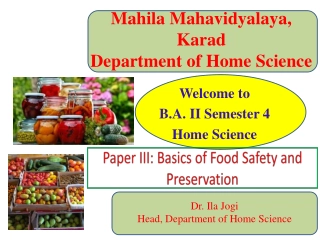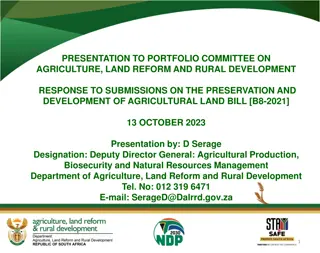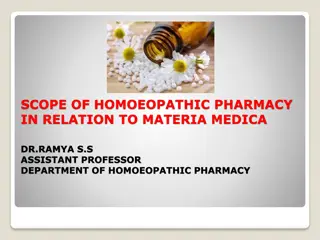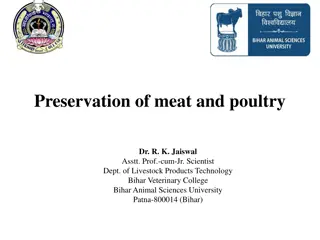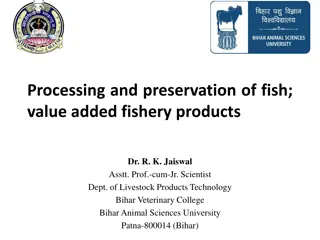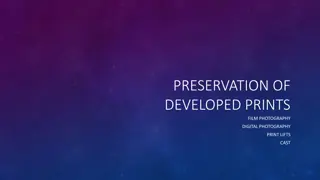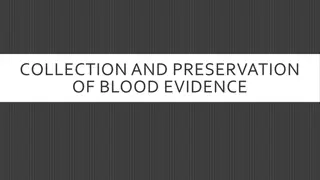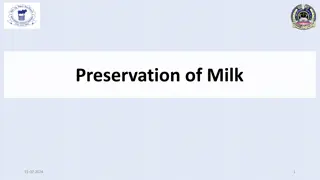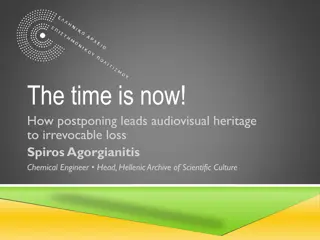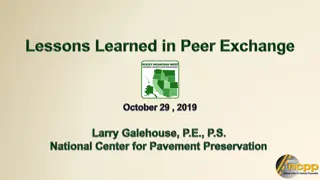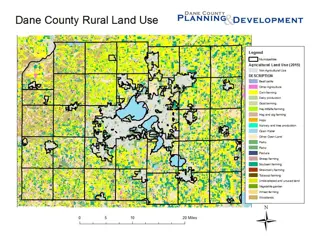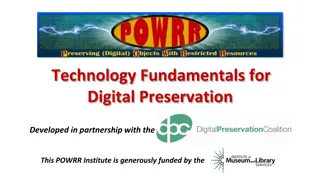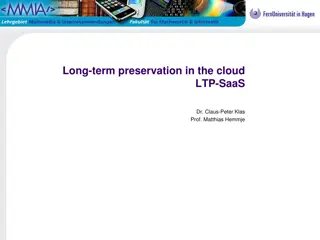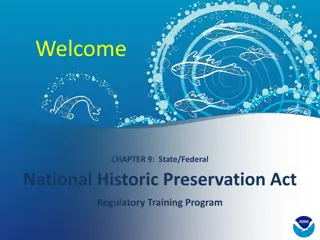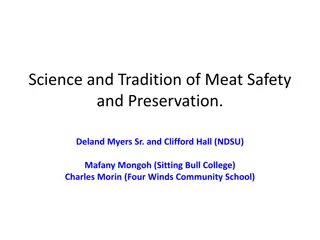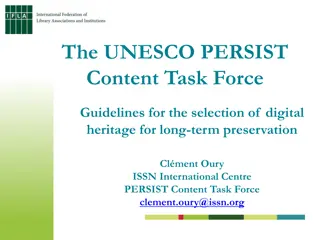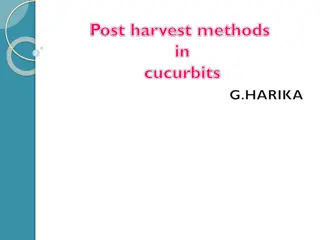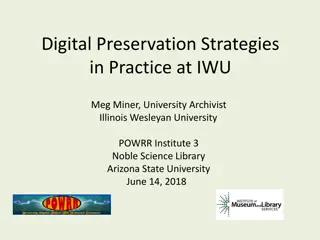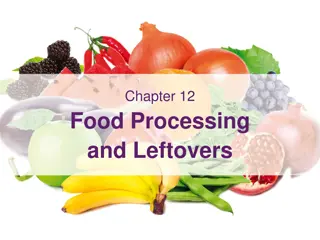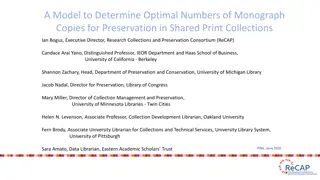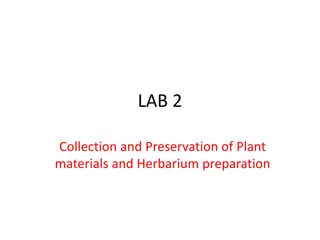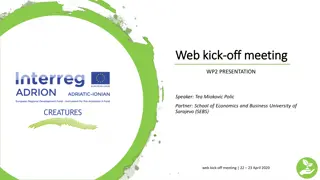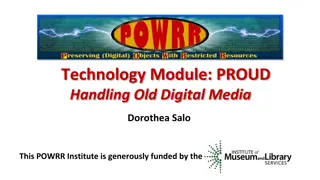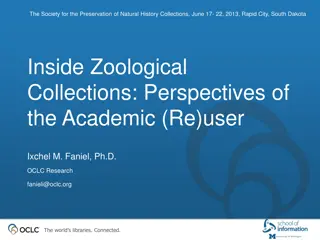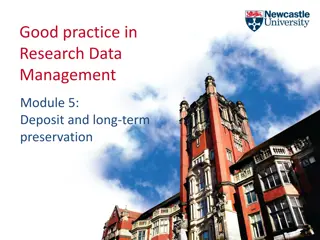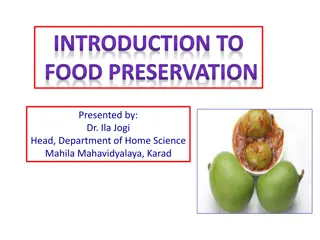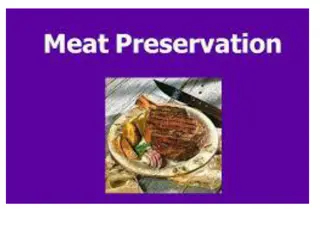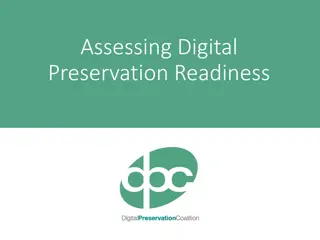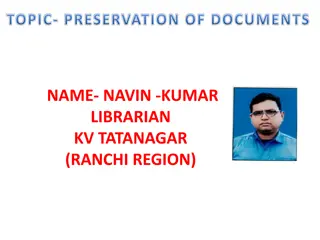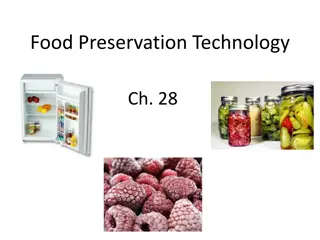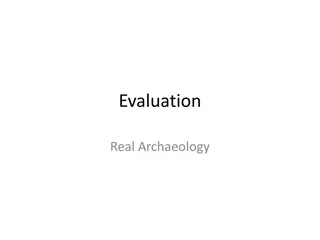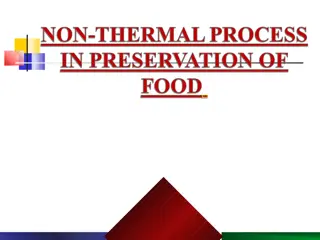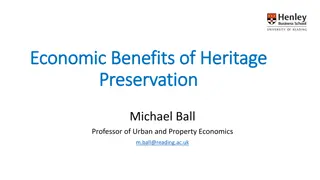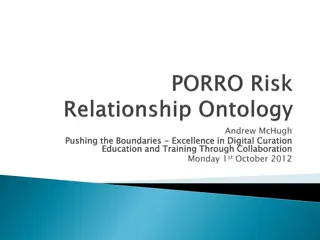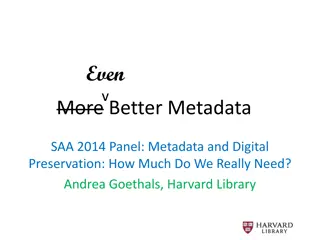Comprehensive Guide to Food Safety and Preservation in Home Science
Explore the world of food safety and preservation through this detailed course in Home Science at Mahila Mahavidyalaya, Karad. The course covers topics like basics of food safety, principles of food preservation, methods of food preservation, and practical sessions on preparing various food items. G
1 views • 6 slides
Response to Submissions on Preservation and Development of Agricultural Land Bill
Deputy Director General D. Serage presents to the Portfolio Committee on Agriculture, Land Reform, and Rural Development regarding the feedback received on the Preservation and Development of Agricultural Land Bill. Various organizations made oral and written submissions during public hearings, cont
0 views • 71 slides
Analysis of Union Township Land Use and Recommendations for Improvement
Union Township faces challenges with potential overdevelopment impacting its rural and agricultural character. This document outlines the purpose, goals, and importance of the Master Plan, zoning map, and preservation areas. Recommendations aim to balance smart development with landscape preservatio
0 views • 30 slides
Arkansas Historic Preservation Program
This content provides insights into the Arkansas Historic Preservation Program (AHPP) grants aimed at supporting the preservation, restoration, and rehabilitation of historic properties in Arkansas. The grants focus on maintaining structural integrity, addressing deficiencies, ensuring safety and co
1 views • 23 slides
Role of Homoeopathic Pharmacy in Understanding Materia Medica
Studying homoeopathic pharmacy is crucial for understanding the sources, collection, preservation, preparation, potentisation, prescription, and dispensing of medicines. It aids in identifying short-acting, deep-acting remedies, selecting potencies, and recognizing drug families. Knowledge of drug s
0 views • 9 slides
Preservation Methods for Meat and Poultry: A Comprehensive Overview by Dr. R. K. Jaiswal
Dr. R. K. Jaiswal discusses the principles and methods of preserving meat, emphasizing the importance of preventing spoilage. Topics include drying, freeze-drying, salting, curing, low and high-temperature preservation, and more. The article explores historical practices, modern techniques, and the
0 views • 44 slides
Fish Processing and Preservation Methods for Quality and Longevity
Fish are highly perishable and require proper preservation techniques to maintain their quality and freshness. Methods such as chilling, freezing, and other preservation techniques are employed to extend the shelf life of fish for short and long durations. Quick freezing is preferred for long-term s
1 views • 17 slides
Understanding Preservation and Techniques in Photography
Preservation of developed prints in film photography and digital photography involves methods such as film and digital photography, latent print lifts, and casting materials. Learn about the structure of cameras, the process of film photography, and how digital photography works with sensors and pix
1 views • 20 slides
Blood Evidence Collection and Preservation Guidelines
Learn about the proper collection and preservation methods for liquid blood, dried stains, stained clothing, swabs of stains, and envelopes in forensic investigations. Follow detailed instructions for identification, preservation, wrapping, and packing to ensure the integrity of blood evidence.
0 views • 11 slides
Milk Preservation Techniques and Methods
Milk can be preserved using various techniques such as chilling, pasteurization, and chemical preservation methods like hydrogen peroxide. The shelf life of milk can be extended by cooling or utilizing the lactoperoxidase system. Germicidal properties of fresh milk and naturally occurring inhibitory
4 views • 16 slides
The Time is Now: Urgency of Audiovisual Preservation
Postponing digital preservation of audiovisual heritage can lead to irreversible loss. The urgency lies in the deteriorating nature of audiovisual media and the necessity of digitization for long-term preservation. Challenges include lack of awareness, obsolescence of playback equipment, and excuses
0 views • 26 slides
National Wilderness Preservation System Overview
Explore the history, purpose, and values of the National Wilderness Preservation System in the United States through this presentation. Discover key facts, trends, and management principles related to over 109 million acres of protected wilderness areas managed by federal agencies. Gain insights int
0 views • 13 slides
Pavement Preservation Treatment Knowledge Transfer Analysis
The analysis discusses the peer exchange facilitators, knowledge transfer process between Lead and Explorer States, disadvantages of limited knowledge transfer, and details of pavement preservation treatment experience in various states. It emphasizes the importance of sharing expertise to enhance p
0 views • 48 slides
Dane County Farmland Preservation Plan Overview
This overview highlights the Dane County Farmland Preservation Plan, which includes planning areas, preservation programs, zoning regulations, density caps, siting criteria, and more to protect agricultural lands and promote sustainable development in Dane County, Wisconsin.
0 views • 9 slides
Technology Fundamentals for Digital Preservation
This course covers common computer systems, file formats, open-source software, and the OAIS standard for digital preservation. Participants will learn about operating systems, file systems, and file format preservation issues. The course also explores the differences between Windows and Unix operat
1 views • 80 slides
Long-term Preservation in the Cloud: Data Management and Architecture Overview
Exploring the intricate landscape of long-term preservation in the cloud, this material delves into data management life cycles, roles, preservation awareness, collaborative search and access mechanisms, OAIS compliance, and user interface considerations. It highlights the importance of proactive pr
0 views • 10 slides
National Historic Preservation Act: Background and Requirements
The National Historic Preservation Act (NHPA) was established in 1966 to protect historic resources in the United States. It was a response to the alarming damage caused by large-scale projects post-World War II. The Act requires federal agencies to consider the impacts of their undertakings on hist
2 views • 18 slides
Enhancing High Energy Physics Research Through Analysis Preservation and Generator Tuning
Delve into the world of high-energy physics with a riveting journey through the analysis preservation and tuning of hadronic interaction models. Learn about the motivation, goals, and processes involved in making research results accessible, publicly available, and reproducible. Explore the tools an
0 views • 23 slides
Exploration of Meat Preservation Techniques from Various Cultures
This project delves into the science and tradition of meat safety and preservation, focusing on beef jerky as a counterpart to traditional Native American dried meats. It includes activities like preparing jerky, evaluating salt's impact on preservation, and sensory testing. Additionally, it explore
0 views • 23 slides
UNESCO PERSIST Content Selection Guidelines: Long-Term Preservation Strategy
Providing guidance to memory and cultural institutions on selecting digital heritage for preservation, the UNESCO PERSIST Content Task Force emphasizes the importance of safeguarding digital materials for future generations. Highlighting the risk of losing valuable heritage, the guidelines stress th
0 views • 15 slides
Post Harvest Methods in Cucurbits - Importance and Techniques
Different types of fruits and vegetables are grown in India due to varied agro-climatic conditions. India, being the second largest producer globally, faces significant post-harvest losses. Improper management practices such as careless harvesting, inadequate storage facilities, and processing metho
0 views • 39 slides
Practical Strategies for Digital Preservation at IWU
Explore digital preservation strategies in practice at Illinois Wesleyan University. Learn from Meg Miner, the University Archivist, about preservation philosophy, local-centric decisions, and the importance of prioritizing digital collections inventory. Gain insights into updates on processing acti
0 views • 33 slides
Food Processing and Leftovers: Understanding Preservation Techniques
Food processing plays a crucial role in preserving and extending the shelf life of foods. This chapter explores the advantages and disadvantages of food processing, the conditions microorganisms need to grow, various methods of food preservation, guidelines for freezing food, the significance of bla
0 views • 33 slides
Optimal Monograph Preservation in Shared Print Collections
A model is proposed by Ian Bogus, Candace Arai Yano, Shannon Zachary, Jacob Nadal, Mary Miller, Helen N. Levenson, Fern Brody, and Sara Amato to determine the ideal number of monograph copies for preservation in shared print collections. The model considers variables such as on-shelf probability, bi
0 views • 11 slides
Plant Collection and Preservation Techniques
Explore the process of collecting and preserving plant materials for herbarium preparation. Learn about the importance of plant documentation, including dry and wet preservation methods. Understand why plant collection is crucial for systematics studies and serving as a reference collection for name
0 views • 25 slides
Enhancing Cultural Heritage Preservation and Sustainable Tourism through CCI and SME Capacities
This project aims to enhance knowledge, skills, and competitiveness of Cultural and Creative Industries (CCI), Small and Medium Enterprises (SMEs), and startups in supporting cultural heritage preservation and sustainable tourism. Activities include developing a common working methodology, E-catalog
0 views • 27 slides
Handling Old Digital Media for Preservation: Equipment, Procedures, and Outsourcing Options
Learn how to handle old digital media effectively for preservation, including equipment requirements, write-protection methods, and capturing disk images. Understand the importance of copying data promptly due to media fragility. Explore in-house and outsourcing options for preserving valuable digit
0 views • 24 slides
Digital Preservation in Academic Research Data Reuse
The Society for the Preservation of Natural History Collections conducted a project funded by IMLS to study data reuse and digital preservation in academic disciplines. The research team explored significant properties of social science, archaeological, and zoological data for effective preservation
0 views • 14 slides
Best Practices for Research Data Management: Deposit and Long-Term Preservation
Explore essential topics in long-term data management, including considerations for data centers and repositories, metadata usage, and digital curation. Understand the distinctions between digital archiving, preservation, and curation, along with key questions regarding data deposits and embargoes.
1 views • 28 slides
Understanding Food Preservation: Techniques and Importance
Food preservation is a crucial aspect of ensuring food safety, extending shelf life, and preventing spoilage. This article delves into the definition of food preservation, its objectives, and the importance of preserving foods. From preventing microbial contamination to increasing food availability,
0 views • 10 slides
Bridge Preservation Partnerships: Upcoming Meetings and Initiatives
Explore upcoming meetings and initiatives of various Bridge Preservation Partnerships across different regions in the United States. Topics include deck preservation, emergency response, resilience, research needs, performance measures, and technical tours. Stay informed about the latest development
0 views • 20 slides
Methods of Meat Preservation and Drying Techniques
Meat preservation is crucial to prevent microbial spoilage during distribution and storage. Methods include physical (drying, refrigeration, heat) and chemical (salting, smoking) techniques. Drying meat reduces water content, inhibiting microbial growth while prolonging shelf life. Various drying me
0 views • 33 slides
Assessing Digital Preservation Readiness: A Comprehensive Guide
Explore the key aspects of digital preservation readiness, including assessing current status, setting goals for improvement, benchmarking strengths and weaknesses, maturity models, and important questions to consider before starting. The guidance covers the NDSA Levels of Digital Preservation, cate
0 views • 13 slides
Importance of Preservation in Libraries for Future Generations
Preservation in libraries is crucial to protect documents from deterioration caused by various factors like climate and physical damage. The preservation of library materials ensures that valuable cultural records are passed down to future generations for continued access and knowledge dissemination
0 views • 25 slides
Food Preservation Technologies: Freezing, Freeze-Drying, and Irradiation
Explore the various methods of food preservation such as freezing, freeze-drying, and irradiation. Learn how freezing slows enzyme action and prevents microbial growth, while freeze-drying preserves food by removing moisture through sublimation. Discover how irradiation destroys spoilage organisms t
0 views • 11 slides
Understanding Phases of Archaeological Evaluation for Site Preservation
In historic preservation archaeology, the evaluation process involves distinct phases from background research to data recovery. During a Phase 2 evaluation, archaeologists assess a site's eligibility for listing on the National Register of Historic Places by determining its integrity and potential
0 views • 13 slides
Innovations in Non-Thermal Food Processing Techniques
Non-thermal processing methods have emerged as a solution to the limitations of thermal food processing, offering benefits such as better retention of volatile compounds, nutrients, and flavors. This article explores various non-thermal techniques like Ohmic Heating, Microwave Heating, Pulsed Electr
0 views • 16 slides
Economic Benefits of Heritage Preservation and Successful Strategies for Adaptive Reuse
Exploring the economic advantages of heritage preservation, this content highlights the value of heritage as a consumption good, attracting skilled labor, boosting economies, and encouraging innovation. It emphasizes the key lessons for successful heritage preservation, the need for investments in a
0 views • 13 slides
Advancing Digital Preservation Through Risk Assessment and Ontology
Explore the innovative approach of utilizing risk assessment methodologies and ontology to enhance digital preservation strategies. Learn how these tools help in identifying risks, mapping mitigation measures, and aligning real-world objectives with preservation goals for effective management of dig
0 views • 11 slides
Evaluating Metadata Quality for Digital Preservation at Harvard Library
Explore the importance of metadata quality in digital preservation with insights from Harvard Library's experience managing their Digital Repository Service. Discover challenges faced with user-contributed metadata and the necessity for systematic validation and tracking to ensure accurate preservat
0 views • 17 slides
